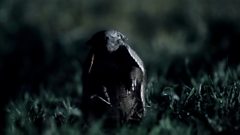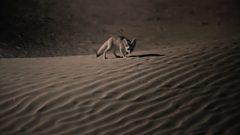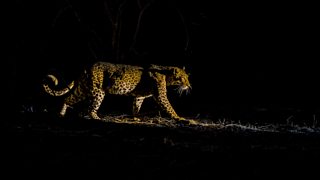The dark, a world of opportunity for mammals. More than two-thirds prefer the cover of the night, with some now returning to the safety of the shadows in order to avoid us.
The night might be a time we avoid, but for the majority of mammals it has always been a world of opportunity. Mammals first emerged two hundred million years ago, during the time of the dinosaurs. To avoid competition with these mighty rivals, they stayed small and only active at night. And many have since chosen to stay there, becoming masters of the shadows. Today, more than two-thirds of mammal species are nocturnal. We uncover the intriguing strategies they have evolved, from remarkable senses to teamwork, intelligence and adaptability, that have enabled them to overcome a time we find so challenging.
Nocturnal mammals have developed an array of sharp senses. And, unlike us, many are blessed with incredible night vision. A leopard’s sight is so sensitive, it can see even on the darkest of nights, helping it target prey as they sleep high up in the treetops. In the empty expanse of the Sahara, fennec foxes’ enormous ears and remarkable hearing help them to track down their elusive quarry, even those hiding under the sand. The Etruscan shrew, the smallest terrestrial mammal in the world, has honed one of the most ancient senses of all to hunt. With its incredibly sensitive whiskers, it successfully uses touch to find its prey, often as big as itself, hiding in the undergrowth. And an amorous armadillo’s acute sense of smell isn’t just used to find food in the dark. They also use it to communicate, sending secret scented messages to each other in the breeding season - with humorous results. But it’s when mammals combine these remarkable senses and work together as a team that they achieve the most incredible feats in the dark.
In Ngorongoro crater in Tanzania, where some of the largest clans of hyena in Africa are found, hyenas combine forces, hunting together at night, enabling them to overpower one of the largest and most dangerous animals in Africa – the Cape buffalo. Underground in the Kalahari Desert, one of the stranger mammals, the Damaraland mole rat, has taken teamwork to a whole new level. These mole rats have found an intriguing way to overcome a subterranean life in permanent darkness.
But there is one night-time mammal success story that is above all others. Bats, the only mammal able to fly, have mastered the night skies almost everywhere on Earth, thanks to their ability to fly and to echolocate. Echolocation is nature’s sonar, enabling them to create a mental map of their surroundings even in pitch black. And some use this seemingly supernatural power to hunt the most unexpected prey. Off the coast of Trinidad, greater bulldog bats have learnt how to fish. Their echolocation is so sensitive, they can detect the faintest of clues. Just a fish’s fin breaking the surface is all they need to start fishing, with spectacular results. Echolocation has enabled bats to truly master the night. Today, more than one quarter of all mammal species are bats. And that’s not all. They also form the greatest gatherings of mammals on Earth. In the heart of Austin, Texas, every evening in August, crowds gather at Congress Avenue Bridge to witness one of life’s greatest spectacles, as one and a half million bats flood out from this daytime roost in the heart of the city.
For many mammals, this journey into the night is far from over. Today, some mammals are shifting back to the night, just as they did two hundred million years ago, to avoid competition with daytime dinosaurs. But today, they are doing it to avoid the modern equivalent – us. In recent years, one of America’s most successful predators, the coyote, has taken the night shift, enabling it to move into the heart of some of America’s busiest and biggest cities. Chicago is now home to 4,000 coyotes, and they surprisingly haven’t moved in to live on trash. In the city’s downtown parks, they have found a wealth of wild prey, hunting whilst the city sleeps.
Last on
More episodes
Previous
You are at the first episode
Clips
-
![]()
Behind the scenes - Filming hyenas in the dark
Duration: 01:30
-
![]()
An armadillo goes looking for love
Duration: 02:31
-
![]()
Listening for food in the Saharan Desert
Duration: 01:51
-
![]()
Bats congregate in Austin, Texas
Duration: 02:22
Credits
| Role | Contributor |
|---|---|
| Narrator | David Attenborough |
| Producer | Stuart Armstrong |
| Series Producer | Scott Alexander |
| Executive Producer | Roger Webb |
Broadcasts
- Sun 31 Mar 2024 19:00
- Sun 7 Apr 2024 16:05���˿��� One Wales HD & Wales only
- Sun 7 Apr 2024 16:35���˿��� One except Wales & Wales HD
- Mon 10 Jun 2024 08:00
Featured in...
![]()
Earth Day
Facts about the environment and the challenges facing our planet to mark Earth Day.
![]()
You and Your World
Explore and learn about the world around you ...
![]()
Sir David Attenborough
Sir David Attenborough's amazing programmes from the 1950s to the present day.
![]()
iPlayer Top Picks
From laughs to thrills and spectacular true stories, we've got it covered on iPlayer!
![]()
Sir David Attenborough
His incredible programmes and his amazing career - all in one place
![]()
iPlayer 13-15 ���˿���page :: Documentaries
iPlayer 13-15 ���˿���page - Documentaries
![]()
iPlayer Science and Nature Category :: Featured Episodes
iPlayer Science and Nature category featured programmes







